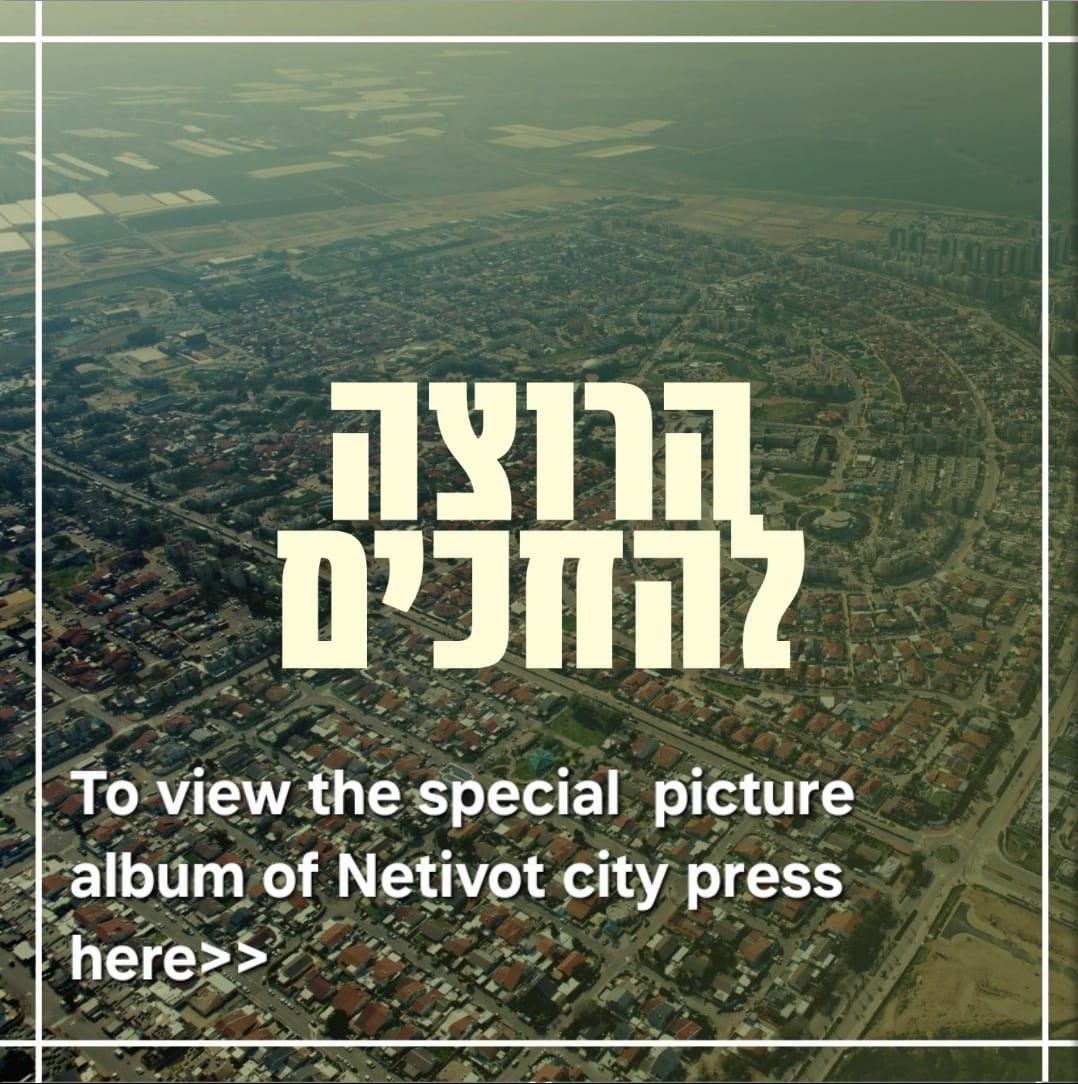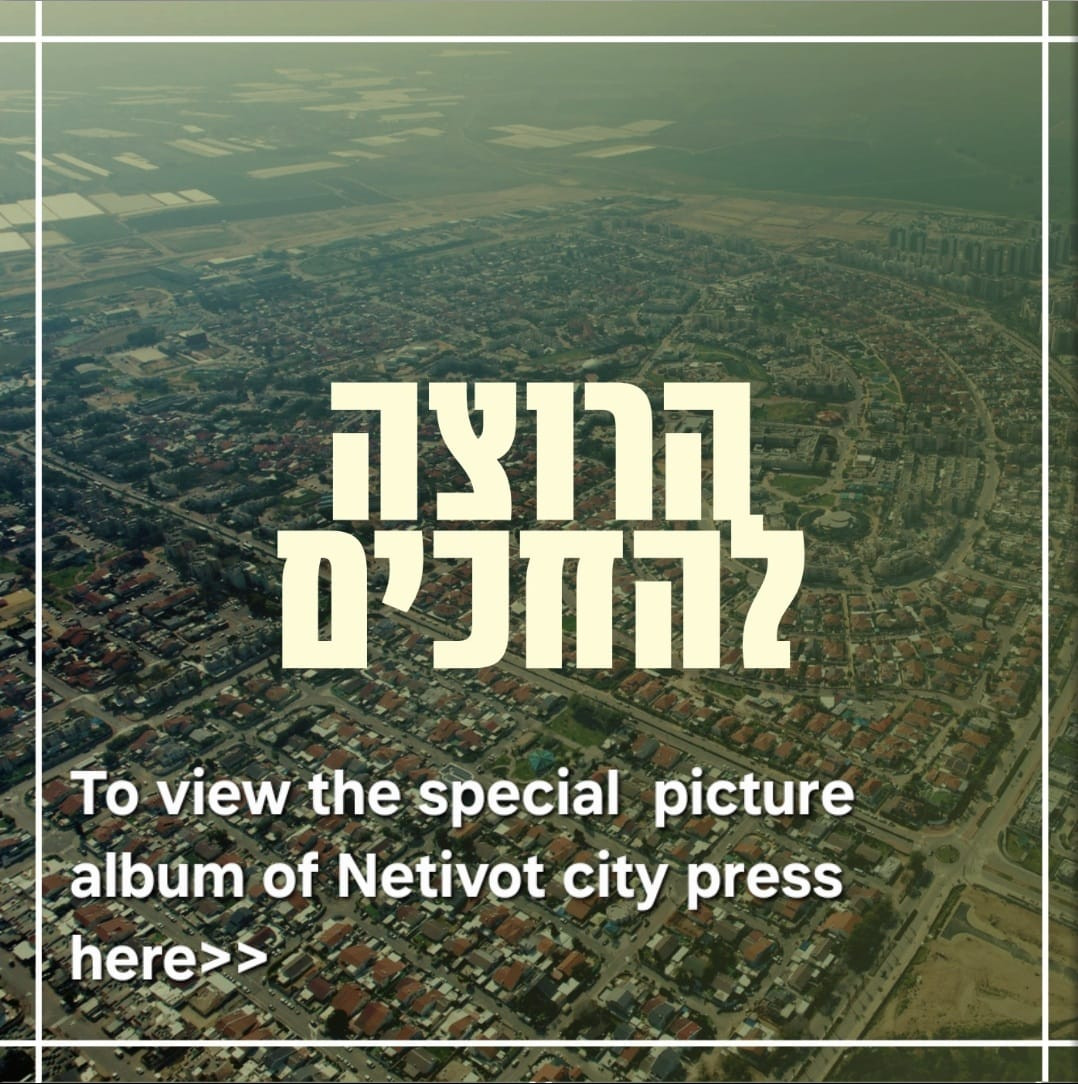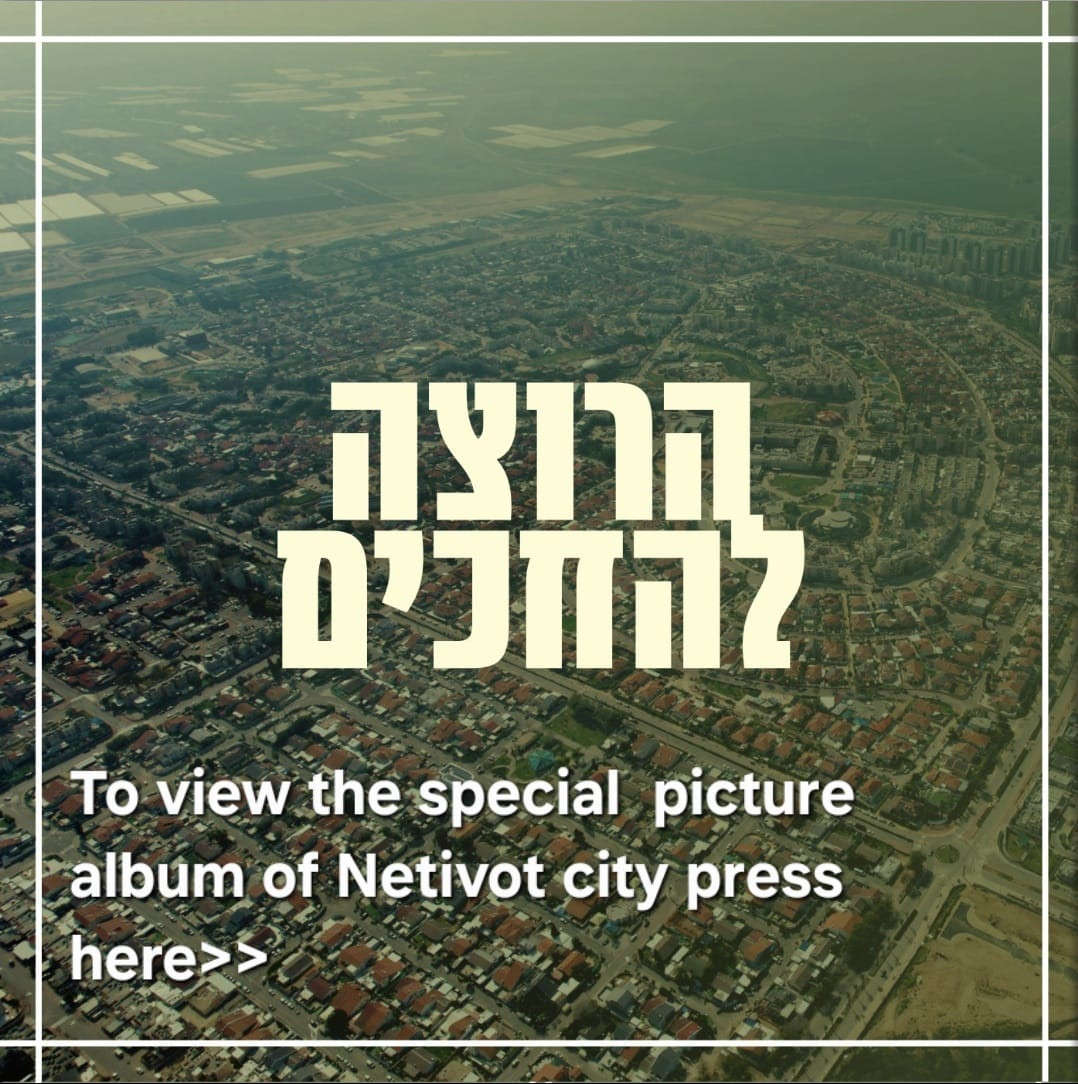The southern periphery is quickly catching up to the center: there is an accelerated wave of building and development across the south, particularly in Netivot, which boasts the country’s more expansive building plans. Alongside tens of thousands of housing units already under construction, the government is investing astronomical sums into the area’s growth: from developing a state-of-the-art industrial park, to founding a national hi-tech center, to building a new rail network that will drastically reduce commute times to the center of the country.
>> All the details on the meteoric rise of the Torah city of the south below.
The air is filled with an intoxicating scent of fresh beginnings, the pounding of hammers, and the rumble of construction vehicles. Young couples and growing families are arriving by the day to see the massive construction of thousands of housing units—and to sign on the dotted line for their new homes.
The Torah city of the south is experiencing a surge in construction, development, and population growth it hasn’t seen since its establishment. Thousands of new units have gone up in the past few years; many are expected to be move-in ready soon, and tens of thousands more are expected to be built in the coming years. There is no doubt: Netivot has become the premier alternative for bnei Torah seeking to live in a strong, serious kehilla of yungeleit with excellent mosdos chinuch and communal support, at prices that simply don’t exist anywhere else in the country.
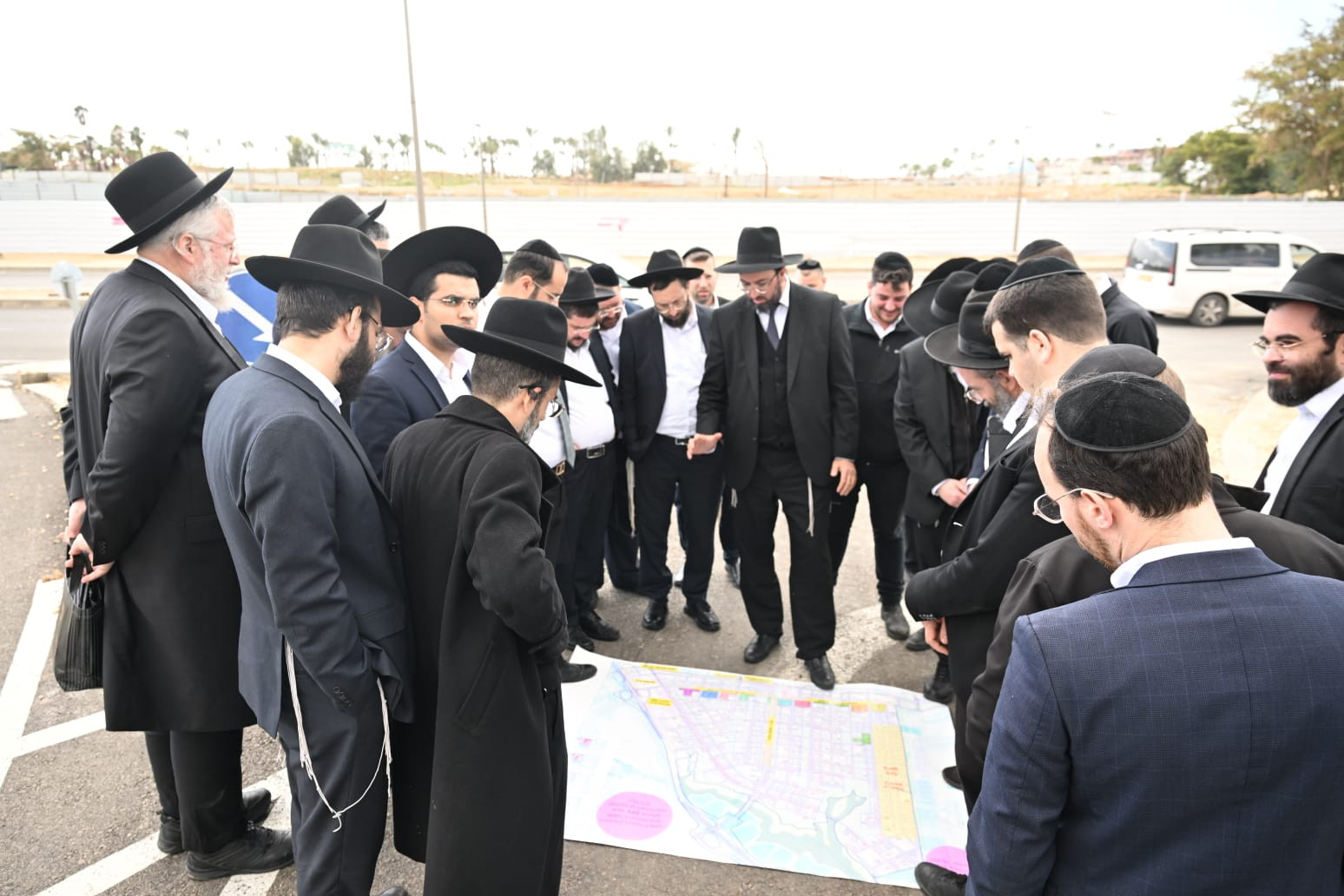
Roshei Kehillos from Yerushalayim, Bnei Brak, and Modiin Illit during a visit to the Kiryat Beit Halevi site following the completion of Stage A sales to hundreds of young avreichim.
A Wave of Growth and Renewal
It’s important to note that Netivot is part of a broader surge of development and renewal. In recent years, the entire southern region has been undergoing a rapid and intense development process, with major investments in infrastructure, transportation, entrepreneurship, and business spearheaded by the Israeli government. Close to 70% of current and future national development plans are centered in this region, making it, without question, the most promising investment channel in today’s market.
And the good news doesn’t end there: the government has earmarked tens of thousands of new homes for the entire region. Beyond the 36,000 housing units set to be built in Netivot, another 34,000 will soon be put on the market in nearby Kiryat Gat, 18,000 more in Ofakim, and another 10,000 in Yerucham. This is in addition to those in Kasif—a new city currently in advanced planning stages, expected to include 50,000 units in its first phase—and the future city of Tila, where another 20,000 homes are expected.
This broad supply of housing stands in stark contrast to the severe shortage and skyrocketing prices of available apartments in central Eretz Yisroel. Adding to the challenge, much of the available inventory under government subsidized plans like “Mechir Lemishtaken” (Buyer Fixed Plan) is now being designated for army reservists, leaving young charedi couples little realistic chance of securing a home of their own in the center. All of this makes Netivot the obvious choice.
What’s more, planning and development officials are now projecting that around 70% of young charedi couples will end up settling in the south in the coming years, simply due to the lack of room in central areas. One thing is already clear: Netivot is the city in the periphery with the largest available land reserves in the country.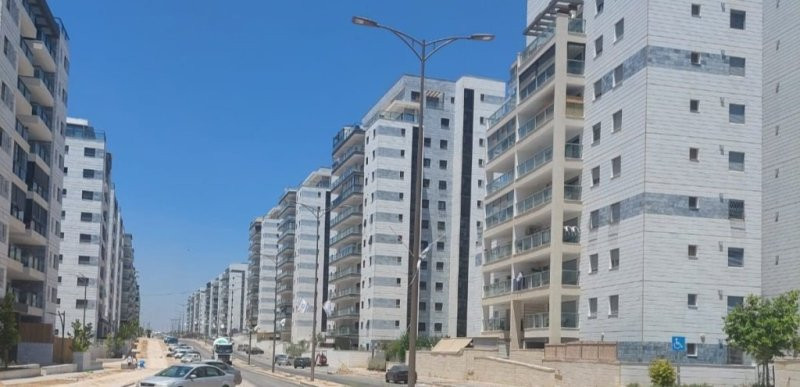
Thousands of new apartments are already under construction in the new neighborhoods of Netivot.
A Strong Torah Foundation, Through and Through
What is it about Netivot that’s drawing so many young couples in recent years?
Isolating Netivot from the broader southern region, we find that in the past few years alone, the city has signed two Heskemei Gag—national housing acceleration agreements—worth a total of 11.7 billion shekel.
The result: a 19% population increase in just one year (2023–2024), including 8,000 new families and 1,500 new apartments currently being built in the charedi neighborhoods.
In addition, there are ongoing plans to expand Netivot’s charedi neighborhoods with another 17,500 housing units. Of those, 3,000 units have already gone out for tender, and another 3,000 are expected to follow in the coming months. This is aside from the 17,000 apartments being built in other areas of the city.
These numbers reflect a stable and significant growth trajectory for Netivot in the coming years, offering more families the ability to settle down and build a future in a place of Torah.
To give some perspective: the entire city of Modiin Illit—including Kiryat Sefer, Brachfeld, and its surrounding neighborhoods—comprises approximately 11,500 housing units. That’s less than one-third of the new apartments planned for Netivot alone, underscoring the tremendous potential of this emerging makom Torah to become a primary magnet for bnei Torah from across Eretz Yisroel.
But beyond the expansive housing supply—which naturally impacts pricing and makes it realistically possible for almost any young couple to buy a home they can afford—Netivot’s development is deeply rooted in the foundations laid by gedolei Torah from decades past. Maranan v’Rabbanan: Maran Rosh HaYeshiva HaGaon Rav Yissocher Meir, zt”l, HaGaon HaTzaddik Rav Reuven Yosef Gershonowitz, zt”l, and HaGaon HaTzaddik Rav Chaim Friedlander, zt”l. These spiritual giants not only established the city’s chinuch infrastructure, they shaped the values and derech hachayim guiding its next generation’s chinuch and ruchniyus.
Currently, Netivot’s charedi kehilla numbers over 1,200 families. It is led by Maran Rosh HaYeshiva HaGaon Rav Aryeh Levi, shlit”a—Rosh Yeshivas HaNegev–Schar Sachir—and the mara d’asra, HaGaon Rav Shmuel Montag, shlit”a. Prominent Roshei Yeshiva across Eretz Yisroel are instructing their talmidim to buy homes in Netivot, where they can benefit from spacious apartments that offer harchavas hadaas, while remaining firmly rooted in a top-tier Torah environment.
The city’s mosdos chinuch, along with dozens of kollelim, form an inseparable part of local life, offering a deep, multi-dimensional, spiritual and educational support system for the entire charedi community.
A letter from Maran HaRav Dov Landau, shlit”a, addressed to the hundreds of avreichim who purchased homes in Kiryat Beit Halevi, delivered at the maamad hanachas even hapinah
Parnassah, Infrastructure & Transportation
It hasn’t been all that long since the first frum families settled in Netivot. At the time, local parnassah options were mostly limited to chinuch positions. But in recent years, the employment landscape has undergone a complete transformation.
What many don’t realize is that Be’er Sheva is poised to become the future high-tech capital of Eretz Yisroel. This will have a major impact on the entire southern region, establishing it as a central employment hub. Netivot itself already hosts a high-tech park on the outskirts of the city, and the nearby train line provides quick access to major job centers in the center of the country. The south is also experiencing a wave of new business initiatives, and many local residents are employed in the construction industry, commerce, and service sectors, on top of the thousands of jobs available in chinuch.
One of the most significant developments for the wives of bnei Torah in Netivot has been the expansion of Park Noam, under the leadership of Mayor Yechiel Zohar. Park Noam a large industrial zone in southern Eretz Yisroel, located adjacent to Netivot, in the Western Negev. It’s being positioned to become one of the largest and most advanced employment centers in the country.
The park is already a choshuve source of parnassah and commerce in the south. Plans are now in motion to expand the park by an additional 1,800 dunam, bringing its total area to 2,800 dunam. The expansion will include new factories, commercial space, public buildings, and hotel infrastructure, and is expected to generate thousands of new jobs for the region.
Phase D of the expansion—the final stage of the park’s strategic master plan—was recently approved. It includes 800,000 square meters of designated land for employment, commercial use, public buildings, and hotel development. The goal is to welcome a wide range of companies, including knowledge-based industries, light manufacturing, and skilled trades, in a well-supported, modern environment for workers and visitors alike.
A central element of the expansion is the transformation of Park Noam into a national center for technological innovation. The massive industrial zone will serve as the main base for all government and military high-tech operations, with dedicated R&D facilities, technology incubators, and partnerships with professional institutions. The aim is to attract major companies and turn the region into a prime destination for developers and innovators from across the country and around the world.
Beyond jobs, the park will also contribute to an elevated standard of living for those living in the area. It includes high-quality public spaces, such as scientific gardens, orchards, and industrial art zones. Park Noam is a rare model of advanced industry integrated with sustainability and community development. Once its expansion is complete, it’s expected to become one of the largest and most advanced industrial zones in Eretz Yisroel, delivering lasting value to the economy, society, and quality of life in the Negev.
A Massive Transportation Initiative
While on the topic of transportation, it’s impossible not to take note of one of the most ambitious projects in the country: the High-Speed Coastal Rail Line. This large-scale national project, with an investment of 15.5 billion shekel, will introduce electric trains running at 250 km/h, connecting the south to the center of the country in just 30 minutes.
The Ministry of Transportation estimates that the number of passengers will grow by five-fold from 60 million to 300 million annually. The implications are clear: Netivot, like other southern cities, is no longer stuck in the “periphery.” With a central train station and smooth access to the rest of the country, it’s closer to the center than ever before. It already only takes 67 minutes to travel by train from Netivot to Bnei Brak, and just 73 minutes to Yerushalayim.
Kiryat Beit Halevi: Bringing the Best to Netivot
With massive development underway and the perfect mix of a shamur Torah atmosphere, affordable housing, ample parnassah options, and convenient transportation offers and unprecedented opportunity to put Netivot on the “chareidi city map” and develop it into the Torah city of the Negev.
This initiative—spearheaded by a choshuve group of machzikei Torah—has already begun bringing some of the finest avreichim and bnei Torah from the top yeshivos in Eretz Yisroel.
Thus, Kiryat Beit Halevi will not only have a decisive spiritual impact on the city itself, but is also expected to strengthen the entire southern region. The goal is for Netivot to develop into a strong merkaz of Torah and kehilla life, with wide-reaching spiritual influence across Eretz Yisroel as the Torah city of the Negev, a living expression of ‘harotzeh lehachkim yadrim’.
The Numbers Speak for Themselves
The facts on the ground—and the numbers—tell the story. The Torah community in Eretz Yisroel knows how to choose wisely. In Netivot, a solid and growing Litvish yeshivish kehilla has taken root, alongside vibrant bnei Torah kehillos from the leading Sephardic yeshivos.
The city is home to multiple Torah centers and kollelim, where hundreds of avreichim learn with hasmadah and harchavas hada’as. Many young couples who came to explore the area and initially rented apartments for the short-term have since decided to settle permanently and buy a home, having found the ideal balance: affordable housing, a strong Torahdik kehilla, excellent mosdos chinuch, quality healthcare, diverse parnassah options, and infrastructure that puts Netivot within easy reach of the country’s central charedi cities.
To receive the booklet “HaRotzeh LeHachkim” in album style
Send an email with the word “חוברת” to:
[email protected]


